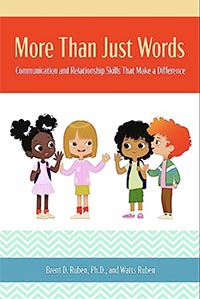
Distinguished Professor of Communication Brent Ruben recently published a new book, “More Than Just Words,” with an unlikely collaborator: his six-year-old granddaughter, Watts Ruben.
Ruben said the book is ideally meant for children to read and discuss with their parents, grandparents, and teachers.
Ruben, who is also an advisor for Strategy and Planning in the Office of the Executive Vice President for Academic Affairs and Senior University Fellow for Rutgers University Organizational Leadership at Rutgers-New Brunswick, said while there are other books focused on effective and satisfying communication and social relations, nearly all of them are written for university or adult audiences.
 SC&I spoke with Ruben to learn where they drew inspiration from and how he, Watts, and other family members worked together on the book.
SC&I spoke with Ruben to learn where they drew inspiration from and how he, Watts, and other family members worked together on the book.
SC&I: What inspired you and Watts to write this book?
BR: The knowledge and skills needed for effective listening, empathy, collaboration, respect for differences of opinion, constructive conversations on difficult topics, and other communication competencies are all critical in relationships, family structures, groups, organizations, communities, and on the world stage. These capabilities are not as widely shared as they could be, and the consequences of the deficiencies are evident. While there is no simple solution to this reality, working to develop these skills early in life can provide a sound foundation for the many opportunities and challenging situations that lie ahead.
Anyone who has spent time watching and listening to children interact with peers, parents, and others, recognizes that their challenges are not unique. Often, they represent scaled-down versions of the same kinds of challenges that confront adults. Therefore, developing increased communication knowledge and skill among young people will serve them well over the course of their lifetimes. We were encouraged to pursue this project by Angela Lampe from Innovative Ink/Kendall Hunt to whom we are very grateful.
SC&I: How do you hope the book will help and/or inspire your readers, including children, parents, grandparents, teachers, and others such as librarians and school librarians?
BR: From the many messages and interactions that confront us each day—personally and through electronic media—it seems pretty clear that there are many opportunities for improvements in communication and social relations in all spheres of activity. The early years provide the foundational knowledge and skill set needed to improve the quality of our interactions. Knowledge, skill, and practice are needed to improve communication competence, social effectiveness, and personal satisfaction. MTJW is designed to help achieve these goals.
Of course, we recognize that there are a great many influences that shape the communication styles and capabilities we develop. One book and the discussions it can prompt will hardly be a panacea to the many challenges parents, teachers, grandparents, counselors, and librarians confront, but we think MTJW can make a valuable contribution to the formative teaching-learning process.
The early years provide the foundational knowledge and skill set needed to improve the quality of our interactions.
SC&I: How can parents, grandparents, and teachers use the book in their classrooms?
BR: MTJW is organized into two broad sections: The first section provides an introduction to key communication ideas and tools, and the second section presents a series of communication tips and mini “case studies” – typical scenarios and hypothetical situations to which the ideas and tools discussed in Part I can be applied. Elementary school students would benefit from using the book with an adult. Older and more mature students will be able to read and work through on their own. For children of all ages, thinking about the situations presented and the optional ways to handle them can be an extremely useful trigger for enriching discussions with older peers, parents, grandparents, teachers, counselors, and librarians.
SC&I: How did you and your granddaughter collaborate to conduct research and write the book?
BR: As “senior” author, a communication professor, parent, and grandparent, I did the drafting of concepts and case study scenarios based on observations and discussions with Watts. As Watts put it: “I helped out by texting with Poppi, to see if anything seemed wrong, also helped with doing questions to go with the scenarios. I also gave Poppi some feedback on the scenarios and questions if there were words I didn’t understand.”
With the help of her parents, Watts provided feedback on the concepts and cases at various stages, and commenting on word choice, clarity, and relevance, and role-playing her own responses to the scenarios, which were recorded and used to refine the content. Grandmother (Mia) and former elementary teacher, Jann Ruben, also was very helpful. Robbi Ruben Urm and Matt Urm, and their children, Rebecca, Nick, and Nate Urm also offered suggestions and scenarios. In many ways, the book was a family effort.
SC&I: What did you learn from the process?
BR: This was my first effort to create materials for young readers. In some ways the goal was to present key concepts and applications from college-level textbooks on communication, but to translate these to be relevant, intelligible and useful for a very different kind of audience. I learned that the process was far more complex and difficult than I had imagined, and as many rewrites of the material were required for this book as for many other adult books. The process challenged me to be clear and succinct in ways that are not always a staple of academic writing.
Knowledge, skill, and practice are needed to improve communication competence, social effectiveness, and personal satisfaction. "More Than Just Words" is designed to help achieve these goals.
As the vignettes were developed and reviewed by Watts, her parents, and other family members, I also discovered that there are generational differences in what are considered the most appropriate ways to handle interpersonal situations.
This is not a new idea in theory, but working through the details of vignettes, questions, and tips provided a reminder of this important issue. In the end, we were able to word the questions and suggestions in a way that would not impinge on generational, family, and personal value and style preferences of potential readers.
I really enjoyed working with Watts—and other family members—on this project and she seemed to like and benefit from the experience as well. Watts explains that “I learned about how to write a book, to be patient, and to tell Poppi my opinions about what should be in the book, and what I thought should be taken out.”
We are considering the idea of collaborating on a second book focused on leadership.
"More Than Just Words" is available to purchase on Amazon and Barnes and Noble.
Discover more about the Communication Department at the Rutgers School of Communication and Information on the website.
Images courtesy of Brent Ruben.
